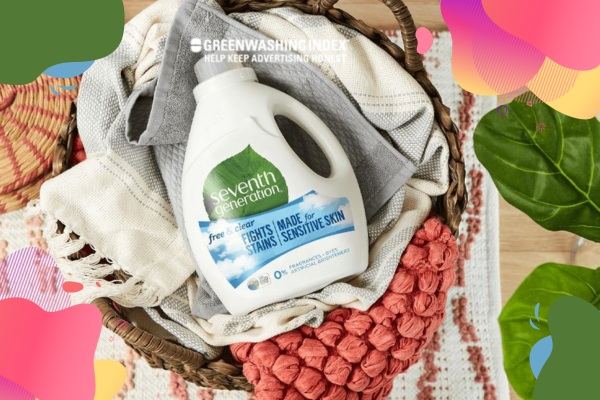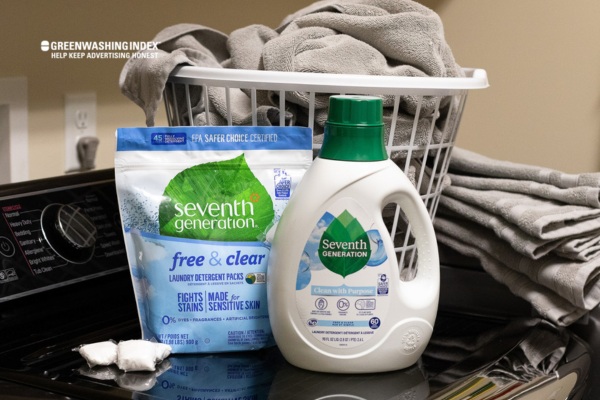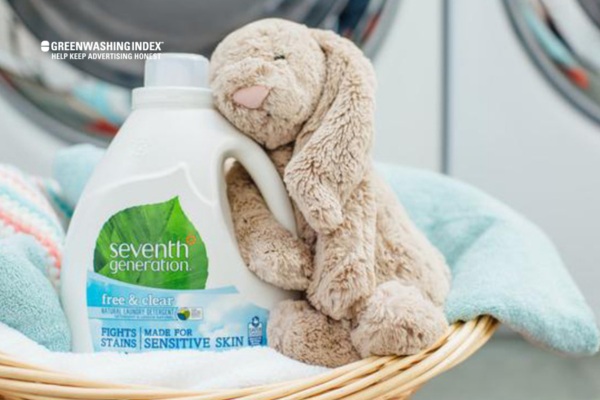

Seventh Generation has emerged as a prominent name in eco-friendly cleaning products, gaining attention for its commitment to sustainability. With a focus on plant-based ingredients, it promises effective cleaning without harsh chemicals.
However, the question arises: is Seventh Generation greenwashing? This term refers to misleading claims about environmental benefits, and as consumers become more environmentally conscious, the scrutiny on brands intensifies.
As we explore the effectiveness and authenticity of Seventh Generation’s eco-friendly claims, the balance between marketing and genuine sustainability becomes increasingly significant.
Seventh Generation has established itself as a leader in the eco-friendly cleaning product market, renowned for its commitment to sustainability and transparency.

However, the brand faces scrutiny regarding its environmental claims, with some critics questioning whether it engages in greenwashing—a practice where companies exaggerate or misrepresent their sustainability efforts.
This overview highlights what makes Seventh Generation detergent stand out while addressing concerns related to greenwashing.
Commitment to Sustainability: Seventh Generation is dedicated to creating products that are environmentally friendly. The company aims to make all its products free from chronic toxins by 2025 and is committed to using 100% non-fossil fuel-sourced energy for its operations. This ambitious goal reflects their genuine intent to contribute positively to the environment.
Ingredient Transparency: The brand was one of the pioneers in the household products sector to disclose all ingredients on its packaging, allowing consumers to make informed choices about what they use in their homes. This level of transparency is crucial in building trust with consumers who are increasingly concerned about product safety and environmental impact.
Eco-Friendly Certifications: Seventh Generation holds several certifications, including being a founding B Corporation, which signifies adherence to high standards of social and environmental performance. These certifications help distinguish the brand in a market where accusations of greenwashing can undermine consumer confidence.
Innovative Packaging Solutions: The company has made strides in reducing plastic waste through innovative packaging designs, such as its EasyDose™ technology, which uses 60% less plastic compared to traditional bottles. This initiative not only minimizes environmental impact but also promotes a more sustainable consumer lifestyle.
Addressing Greenwashing Concerns: Despite its positive initiatives, Seventh Generation has faced allegations of greenwashing. Critics argue that while the brand promotes its sustainability efforts, it must continuously prove that these claims are substantiated and not merely marketing tactics. The company acknowledges these challenges and strives for greater accountability in its operations.
Seventh Generation stands out due to its commitment to sustainability, ingredient transparency, and innovative packaging. However, it must remain vigilant against accusations of greenwashing by ensuring that its practices align with its claims, thereby maintaining consumer trust and loyalty.
What really makes my heart happy is seeing “USDA Certified” on the label because 96 percent of ingredients come from plants – can’t get much closer to nature than that!
Seventh Generation is a well-known American company that specializes in eco-friendly household products. Founded in 1988, it has established itself as a leader in sustainable consumer goods. The company is recognized for its commitment to environmental responsibility and social equity, which is reflected in its product offerings and corporate practices.
In 2016, Seventh Generation transitioned from being a privately held company to becoming part of Unilever, a major multinational corporation. This acquisition has allowed Seventh Generation to expand its reach while maintaining its core values.
Seventh Generation is currently owned by Unilever, which acquired the company in October 2016 for an estimated $600-700 million. This acquisition marked a significant shift for Seventh Generation, transitioning from a privately held entity to part of a global consumer goods powerhouse.
Unilever’s ownership has provided Seventh Generation with additional resources to enhance its mission of sustainability while allowing it to maintain its commitment to social and environmental responsibility. The integration into Unilever’s portfolio has not diminished the brand’s focus on eco-friendly practices; instead, it has been positioned as a key player in Unilever’s strategy to meet the growing consumer demand for sustainable products.
The company’s founding CEO, Jeffrey Hollender, who co-founded Seventh Generation, remains involved through Unilever’s Social Mission Board, ensuring that the original values of the company continue to influence its operations and product development.
Also Read: ECOS Laundry Detergent Review: Honest, Unbiased Insights
Seventh Generation Detergent is a popular choice for consumers seeking eco-friendly laundry solutions. This detergent is designed with plant-based ingredients, making it a sustainable option that is effective against tough stains while being gentle on sensitive skin. Below is a detailed overview of its key attributes and benefits.
| Attribute | Details |
|---|---|
| Brand | Seventh Generation |
| Item Form | Liquid |
| Scent Options | Free and Clear, Lavender, Fresh Scent, Clean Scent, Mango |
| Biobased Content | 96% – 97% Biobased |
| Certifications | EPA Safer Choice Certified, USDA Certified Biobased |
| Key Ingredients | Plant-based ingredients, enzymes, surfactants |
| Cleaning Power | Effective on tough stains |
| Skin Sensitivity | Dermatologist tested for sensitive skin |
Seventh Generation Detergent stands out for its commitment to sustainability and effectiveness, making it an excellent choice for environmentally conscious consumers.
Seventh Generation is a well-known brand in the eco-friendly product market, committed to sustainability and environmental responsibility. Founded in 1988 and based in Burlington, Vermont, the company offers a range of cleaning and personal care products that emphasize the use of plant-based ingredients and recyclable packaging.

Acquired by Unilever in 2016, Seventh Generation continues to innovate in its efforts to reduce waste and carbon emissions while promoting a healthier planet. Here’s an overview of its eco-friendly practices and initiatives.
Seventh Generation exemplifies a commitment to eco-friendliness through sustainable product development, waste reduction initiatives, and active participation in environmental advocacy.
Also Read: How Much Do E-Bikes Cost? Breaking Down the Price Ranges
Seventh Generation Detergent has gained popularity among consumers seeking effective, eco-friendly cleaning solutions. This detergent is formulated with plant-based ingredients and is designed to tackle a variety of tough stains while being gentle on sensitive skin.
As I put its cleaning power to the test against common household stains, I aimed to determine whether this environmentally conscious option could deliver the results needed for everyday laundry challenges.
Grass Stains: To begin, I soaked my child’s soccer uniform, which was heavily stained with grass from playing on the field. After 15 minutes in a solution of water and Seventh Generation Detergent, I scrubbed the knees, and the stubborn grass stains faded significantly after just one wash cycle.
Food Stains: Next, I tested a blouse with a tomato sauce stain from a recent dinner. By applying the detergent directly onto the stain before washing, I found that the sauce nearly vanished post-wash, showcasing the detergent’s effectiveness against food-related stains.
Oil Stains: A pair of jeans marked by oil splatters from bike maintenance posed a challenge. Although not completely removed after one wash—even with pretreating—the oil spots were notably lighter.
Coffee Stains: Finally, I tackled a coffee stain on a white shirt pocket. Remarkably, the brown mark diminished significantly after a regular wash without any special treatment, highlighting Seventh Generation’s stain-fighting capabilities.
The detergent’s triple-enzyme formula plays a crucial role in breaking down tough stains without relying on harsh chemicals. Additionally, it is hypoallergenic, making it suitable for those with sensitive skin.
The product claims to clean 53 medium loads using only plant-based ingredients, making it an appealing choice for environmentally conscious consumers seeking effective laundry solutions.
Also Read: DIY Solar Generator Blueprint: Power Up Your Home!
Seventh Generation is a well-known brand that emphasizes sustainability and the use of plant-based ingredients in its products. Their laundry detergent line is particularly notable for its commitment to environmental responsibility, featuring formulations that are free from synthetic fragrances and dyes.
Below is a detailed overview of the ingredients commonly found in Seventh Generation laundry detergents, highlighting their purposes and sources.
1. Cleaning Agents:
2. Fragrance Ingredients:
3. Enzymes:
4. Preservatives and Stabilizers:
5. pH Adjusters and Other Functional Ingredients:
Seventh Generation’s laundry detergents are designed to be effective while minimizing environmental impact, making them a popular choice among eco-conscious consumers.
Seventh Generation Detergent is frequently mentioned in discussions about eco-friendly laundry solutions, reflecting a growing consumer interest in sustainable cleaning products. This detergent often comes up as a preferred choice among individuals seeking greener alternatives for their laundry needs.

Through conversations with various users, several insights into the performance and perception of Seventh Generation Detergent have emerged:
Performance on Stains: Many consumers commend its effectiveness in stain removal. Users report that it effectively tackles tough stains without the use of harsh chemicals, making it particularly popular among parents dealing with children’s messy clothing.
Sensitive Skin: Feedback regarding skin sensitivity is overwhelmingly positive. Many users with sensitive skin endorse the hypoallergenic formula, noting that it does not cause irritation or adverse reactions, which is crucial for those with skin sensitivities.
Eco-Friendly Aspects: Environmentally conscious consumers appreciate that Seventh Generation products are USDA certified, indicating that a significant portion of their ingredients are plant-based. Additionally, the detergent’s packaging is designed to minimize waste, as it can wash multiple loads before needing replacement.
Fragrance-Free Option: For those who prefer unscented products due to allergies or personal preference, the fragrance-free version of Seventh Generation Detergent is well-received. Users appreciate its ability to clean effectively without leaving any scent behind.
However, there are some criticisms:
Overall, consumer feedback leans positively towards Seventh Generation Detergent. Users highlight its stain-fighting capabilities, suitability for sensitive skin, eco-friendly credentials, and range of fragrance options as significant advantages. Despite some concerns about dosage and scent longevity, many find it a worthwhile choice for sustainable laundry solutions.
Also Read: DIY Washing Machine Cleaner – Easy Homemade Solutions
Seventh Generation is a brand known for its commitment to sustainability and eco-friendly cleaning products, particularly its laundry detergents. These products are designed to effectively clean clothes while minimizing environmental impact.
However, like any product, they come with their own set of advantages and disadvantages. Below is a detailed examination of the pros and cons of Seventh Generation detergent, helping consumers make informed choices about their laundry needs.
Seventh Generation detergent presents a viable option for those seeking eco-friendly cleaning solutions. However, potential buyers should weigh the pros and cons based on their specific needs and preferences.
Who should consider buying Seventh Generation Detergent? In my honest opinion, there are specific folks who’d really see the benefits of switching to this brand. Let’s break it down:
So if I just described you in any of these points, it sounds like Seventh Generation Detergent could be well-suited for you!
When choosing a laundry detergent, it’s essential to consider various factors such as ingredients, effectiveness, and environmental impact. Two popular brands in the eco-friendly segment are Ecos and Seventh Generation.
Both brands emphasize plant-based ingredients and sustainability, but they have distinct formulations and features that cater to different consumer needs. Below is a detailed comparison of Ecos Laundry Detergent and Seventh Generation.
| Feature | Ecos Laundry Detergent | Seventh Generation Laundry Detergent |
|---|---|---|
| Ingredients | Plant-based, primarily coconut-derived | Predominantly plant-based, 97% biobased |
| Stain Removal | Effective but less powerful than competitors | Strong stain-fighting capabilities |
| Environmental Certifications | EPA Safer Choice | EWG Verified, USDA Certified Biobased |
| Hypoallergenic | Yes | Yes |
| Packaging | Recyclable | Made from 100% recycled plastic |
| Performance | Good for general cleaning | Highly rated for stain removal |
| Price Range | Similar to Seventh Generation | Slightly higher on average |
Both Ecos and Seventh Generation offer effective options for those seeking sustainable washing detergents. Ecos is often favored for its gentle formulation, especially among chemically sensitive individuals, while Seventh Generation is recognized for its robust cleaning power and EWG certification, making it a trusted choice for eco-conscious consumers.
Seventh Generation is a reputable brand known for its commitment to eco-friendly household products, focusing on sustainability and ingredient transparency since 1988.
Seventh Generation is committed to sustainability, aiming for all products to be biodegradable or recyclable by 2025, and uses eco-friendly ingredients and packaging.
Seventh Generation laundry detergent is considered safe, made from 97% plant-derived ingredients, and is hypoallergenic, suitable for sensitive skin.
Seventh Generation’s commitment to eco-friendliness is evident in its natural wash just clean detergent, which combines effective cleaning power with sustainability. This product not only fights tough stains with its triple-enzyme formula but also prioritizes safety, being hypoallergenic and made from 96% plant-based ingredients.
It sounds like a responsible choice for those looking to maintain a clean home while caring for the environment. By choosing Seventh Generation, consumers can enjoy peace of mind knowing they are supporting a brand that values both cleanliness and ecological responsibility.
